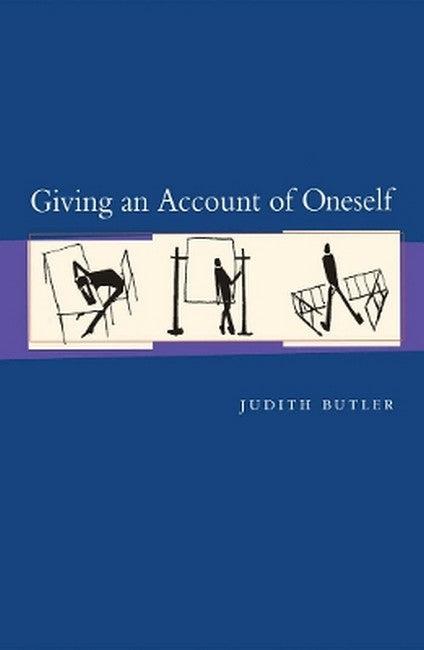Judith Butler is Distinguished Professor in the Graduate School at the University of California, Berkeley. Their books include Who's Afraid of Gender? (2024), What World Is This? A Pandemic Phenomenology (2022), The Force of Nonviolence (2020), Toward a Performative Theory of Assembly (2015), Frames of War: When Is Life Grievable? (2009), Giving an Account of Oneself (2005), Precarious Life: The Power of Mourning and Violence (2004), and Gender Trouble: Feminism and the Subversion of Identity (1990).
Request Academic Copy
Please copy the ISBN for submitting review copy form
Description
"A powerful exploration of the intersection of identity and responsibility, Giving an Account of Oneself shows us Judith Butler at her best, in dialogue with some of the other foremost thinkers of our age: Adorno, Foucault, Levinas, and Laplanche. Confronting the problem of identities that emerge only in relation to social and moral norms they may seek to contest, she proposes a rethinking of responsibility in relation to the limits of self-understanding that make us human." -- -Jonathan Culler Cornell University "A brave book by a courageous thinker." -- -Hayden White University of California and Stanford University "In stunningly original interpretations of Adorno and Levinas, ...Judith Butler compellingly demonstrates that questions of ethics cannot avoid addressing the moral self's complicity with violence. By laying out the premises of a creative rereading, this study proves that the discussion of these two authors and their future legacy has, in a sense, barely begun. Butler writes in a truly Spinozistic spirit, mobilizing the greatest forces and joys of philosophical intelligence to counteract and redirect the cruelest and most destructive of human passions. Brilliantly argued and beautifully written, Giving an Account of Oneself is destined to become a classic, a must read for philosophers and students of present-day culture and politics alike." -- -Hent de Vries The Johns Hopkins University "In a time when moral certitude is used to justify the worst violence, Butler's nuanced reworking of what it means to be ethically responsible to ourselves and to others is welcome indeed." -- -Drucilla Cornell Rutgers University

